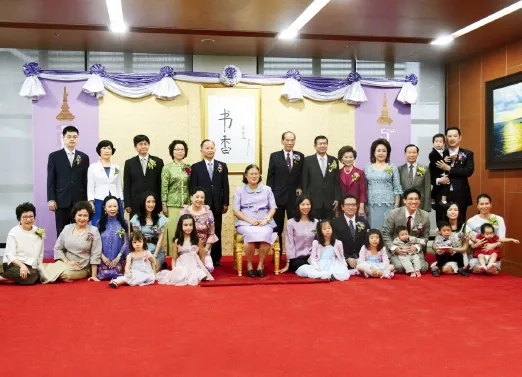Thai Bookseller Preyanee Devoted to Chinese Culture
2016-09-26ByWangFengjuan
By Wang Fengjuan
Thai Bookseller Preyanee Devoted to Chinese Culture
By Wang Fengjuan
On a winter afternoon, in a café where sunlight shone through the curtains,Ms. Preyanee Kongboonma, who was in Beijing for a book fair, sat at a table with a big smile on her face. Although we had never met before, our conversation flowed easily, which shortened the distance between us.
2015 marked the 41st anniversary of the establishment of diplomatic relationship between China and Thailand. However, the Thai publishing house Nanmee and the China International Book Trading Corporation had cooperated for more than 60 years. Preyanee, Deputy Managing Director of Nanmee, followed in the footsteps of her grandfather, Mr. Thongkasem Suputhiponge, who acted as an envoy of friendship, conducting exchanges in publication, culture and education between China and Thailand.
Aspiration of Three Generations
Thongkasem Suputhiponge was instrumental in the establishment of Nanmee. As a young boy, he traveled to Thailand from Chaoyang County, Shantou, Guangdong Province to work in a bookstore. Despite not being well educated, he was eager to read books and hoped that more people would have the chance to do so in Chinese. His desire to make literature available took root, and even amid periods of political upheaval, he persevered.

Preyanee Kongboonma, Deputy Managing Director of Nanmee Publishing House ofThailand
In November 1949, the first Nanmee bookstore officially opened. The small store mainly sold books and textbooks in Chinese in an attempt to promote Chinese culture. Thongkasem Suputhiponge hoped to offer help to those who loved reading Chinese books and promoted the bookstore to play a role in advocating Chinese culture and thought in thailand. this desire to illuminate and educate was evident even in the bookstore's logo, which depicts an unfolded book illuminated by a candle.
“My grandfather had much affection for Chinese books,” Preyanee Kongboonma said with pride. Her assertion is indicative of a sincere and deep-rooted sense of pride among overseas Chinese, that Chinese culture and Chinese characters are unique and wonderful aspects of Chinese culture.
In the 1950s, Chinese education in Thailand didn't receive much attention. Thanks to Thongkasem Suputhiponge's efforts, two Chinese textbooks were initially compiled - Hua Wen Du Ben (Chinese Reading) and Hua Wen Ke Ben (Chinese Textbooks) - and published by Nanmee. At the same time, textbooks published by the Shanghai Bookstore were also sold in Thailand. After that, Nanmee established more branches.
“My grandfather often reminded me never to forget our hometown,” Preyanee Kongboonma adds. “Our roots are in China,and Nanmee's roots lie in Chinese books.”

Preyanee and her family with H.R.H. Princess Sirindhorn of Thailand
For 67 years, Nanmee has devoted itself to the sale of Chinese books. At present, it has grown from a small, obscure bookstore into a 16-story building. As the biggest Chinese bookstore in thailand, its business focuses on dictionaries, textbooks and other books on culture, history, science and literature, and has earned a great reputation among other international sellers of Chinese books. Overseas Chinese in thailand as well as those pursuing education in Chinese language and culture view Nanmee as a valuable resource.
Bridge for Cultural Exchanges
“Nowadays, textbooks in Chinese account for 70-80 percent of the bookstore's business,” Preyanee said. “Life-related books on healthcare, cooking, art and handicrafts are favorites of thai readers.”
Preyanee explained that several years ago Chinese textbooks were not selling well in Thailand, except those about Chinese literature and healthcare. However, as Thai schools began to offer Chinese courses, many Thai children started to learn the language. That's why Chinese textbooks have seen a steady increase in sales.
Apart from selling Chinese books,Nanmee also set up the Thongkasem Suputhiponge Press House to introduce Chinese culture, customs and traditional medicine, as well as some local Thai novels. At the 40th Thailand National Book Fair, Nanmee held a ceremony to launch comic versions of four masterpieces of China: The Romance of the Three Kingdoms, Outlaws of the Marsh, A Journey to the West and A Dream of Red Mansions. Although these classics have already been translated into Thai, their debut as comics is indicative of the staying power of classical Chinese literature.
To help children study Chinese,Nanmee founded the Nanmee Language Academy to provide regular training courses to students aged 3-60. Every year,the Academy recruits 400-500 students. To arouse greater interest in the study,consolidate the achievements made in the Chinese education in Thailand, and cultivate teenage creativity, each year Nanmee holds the Nanmee Chinese Language Skill Competition and a painting competition,from which it awards scholarships and provides schools and educational institutions with stationery and art supplies.
Nanmee has played an important role in promoting the heritage and development of Chinese culture in Thailand, and been widely praised by the Thai royal family, government and overseas Chinese in Thailand. On Preyanee Kongboonma's initiative, the Nanmee Chinese Language Skill Competition has been held for five years running, attracting a great number of participants. Contestants may show their ability in speaking Chinese by way of singing, telling stories or reciting literature.
Book Business Subsidized by Industry
Profit margins in the bookselling business are slender, and books in Chinese have a limited market in thailand. To survive, in addition to selling Chinese books, Nanmee has set up a large factory to produce stationery, office supplies and art materials, as well as an industrial company to sell the products with its own brand.
At present, Nanmee has grown into a strong cultural enterprise that operates a wide range of businesses with a large scale. Nanmee Bookstore has become the largest Chinese outlet in Thailand with a complete variety of goods.
“With development of the Internet, as far as the operation of the bookstore is concerned,it's hard to make money on Chinese books,”Preyanee explainsed. “But my grandfather used to othen tell us to maintain the physical Chinese bookstore.”
When talking about Nanmee's development, she seems concerned. At present, all physical bookstores in Thailand are facing a drop in sales. Nanmee is hoping to underpin its operation and development through diversified businesses including training,publishing, cultural activities and stationery production.
According to Preyanee, if Chinese educational departments can cooperate with their Thai counterparts to develop Chinese textbooks, this will have an impact on Nanmee sales. However, rampant piracy also drags down the profit of textbook sales.
With regard to copyright protection,Nanmee gets no subsidy from China. In daily operation, books are not allowed to be exchanged and returned after being sold. Preyanee Kongboonma hopes China will give more preferential policies on trade tariffs on book imports and exports, which would encourage more thai people to understand Chinese culture.
